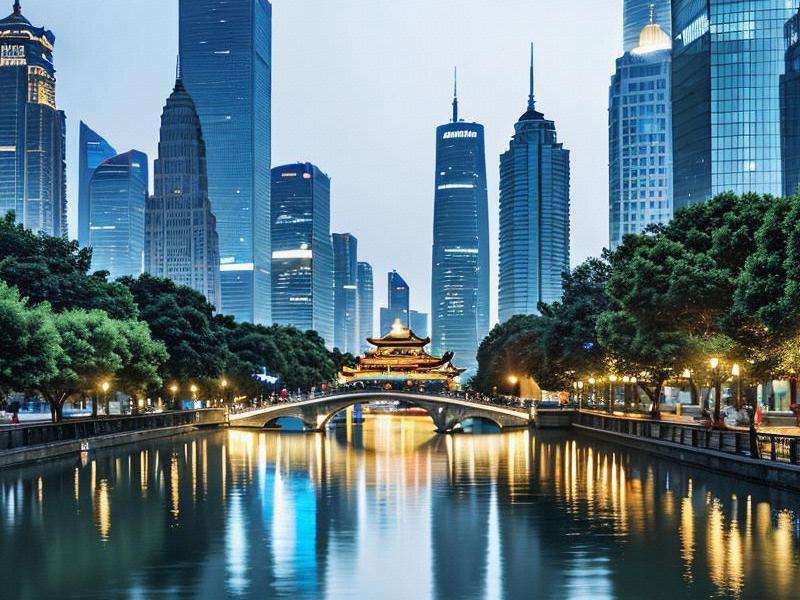Shanghai, a vibrant metropolis on the banks of the Huangpu River, stands as a beacon of China's modernization and a testament to its rich historical legacy. This article delves into the multifaceted aspects of Shanghai, exploring its rapid urban development, preservation of cultural heritage, status as an economic hub, and its growing global influence.

Shanghai, often referred to as the "Pearl of the Orient," is a city that seamlessly blends the old with the new. Its skyline, dominated by the iconic Oriental Pearl Tower and the futuristic Shanghai Tower, is a visual representation of the city's rapid urban transformation. Over the past few decades, Shanghai has undergone a remarkable metamorphosis, evolving from a colonial port city into a global financial center.
The Pudong district, once a rural area, has been transformed into a symbol of China's economic prowess. The Lujiazui Financial District, home to some of the world's tallest skyscrapers, including the Shanghai Tower, Ping An Finance Center, and Jin Mao Tower, is a testament to the city's ambition and drive. These architectural marvels not only serve as commercial hubs but also attract millions of tourists each year, eager to witness the city's skyline from the observation decks.
However, Shanghai's urban development is not without its challenges. The rapid pace of growth has led to issues such as traffic congestion, housing shortages, and environmental concerns. The city government has been proactive in addressing these challenges through initiatives such as the expansion of public transportation networks, the promotion of green buildings, and the implementation of strict environmental regulations.
Despite these challenges, Shanghai remains a city of contrasts, where ancient temples coexist with modern skyscrapers. The Yu Garden, a classical Chinese garden built in the Ming Dynasty, offers a serene escape from the bustling city streets. Similarly, the French Concession, with its tree-lined boulevards and historic architecture, provides a glimpse into the city's colonial past.
上海贵族宝贝龙凤楼 Shanghai's cultural heritage is not confined to its historical sites. The city is also a melting pot of cultures, reflecting the diverse communities that have made it their home. From the vibrant nightlife of Nanjing Road to the tranquil ambiance of the Shanghai Museum, the city offers a rich tapestry of experiences for residents and visitors alike.
The Shanghai Museum, housed in a former palace, is renowned for its extensive collection of Chinese art, including ancient ceramics, calligraphy, and paintings. The museum's collection spans thousands of years, offering a window into the country's rich cultural heritage. Regular exhibitions and educational programs make the museum a popular destination for both locals and tourists.
Shanghai's status as an economic hub is further underscored by its role as a global financial center. The city is home to the Shanghai Stock Exchange, one of the largest in the world, and is a major hub for international trade and commerce. Its strategic location at the mouth of the Yangtze River makes it a gateway to the vast Chinese market, attracting businesses from around the globe.
The city's economic success is not limited to finance. Shanghai is also a leader in innovation and technology, with a thriving startup ecosystem and a strong focus on research and development. The Zhangjiang Hi-Tech Park, often referred to as "China's Silicon Valley," is home to numerous high-tech companies and research institutions, driving the city's technological advancements.
爱上海同城对对碰交友论坛
Shanghai's global influence extends beyond its economic achievements. The city has become a cultural and artistic hub, hosting international events such as the Shanghai International Film Festival and the Shanghai Fashion Week. These events not only showcase the city's creative talent but also attract global attention, further cementing its status as a cultural capital.
The Shanghai International Film Festival, one of the oldest and most prestigious film festivals in Asia, attracts filmmakers and audiences from around the world. The festival provides a platform for emerging talent and fosters cultural exchange through the screening of films from diverse genres and countries. Similarly, the Shanghai Fashion Week has become a global fashion event, featuring the latest trends and designs from renowned designers and brands.
Shanghai's commitment to sustainability and environmental protection is evident in its efforts to crteeaa greener and more livable city. The city has implemented various initiatives to reduce pollution, promote renewable energy, and enhance public transportation. The Bund, a historic waterfront area, has been transformed into a pedestrian-friendly promenade, offering stunning views of the Huangpu River and the city skyline.
爱上海419 The city's green initiatives are also reflected in its urban planning. Shanghai has developed numerous parks and green spaces, such as the Century Park and the Hongqiao Central Greenway, providing residents with opportunities to connect with nature. These efforts not only improve the quality of life for residents but also contribute to the city's overall sustainability.
Shanghai's education system is another area of strength, with a number of world-renowned universities and research institutions. Fudan University and Tongji University are among the top institutions in China, attracting students from around the globe. The city's emphasis on education and research has contributed to its reputation as a hub for innovation and intellectual development.
In conclusion, Shanghai is a dynamic metropolis that exemplifies the best of China's modernization while preserving its rich cultural heritage. Its rapid urban development, status as an economic hub, and growing global influence make it a city of immense significance. As Shanghai continues to evolve, it remains a symbol of China's aspirations and a testament to the possibilities of urban transformation.